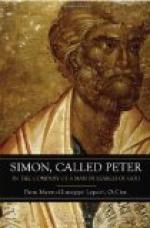There was little more to it. An exhortation to go home to fear and pray and set the house in order against the Day of Wrath, and that was all. “My brethren,” said the young man—and the intensity of his thought lent a certain unusual solemnity to the conventional title—“no one can tell how the events of this week may affect us. Our feet may even now be going down into the Valley of the Shadow of temptation, of conflict, of death, and even now there may be preparing for us a chalice such as we shall fear to drink. Let us pray that in that hour the compassion of Jesus may be real to us, and we ourselves find a sure place in that sorrowful Heart.”
And he was gone from the pulpit without another word. It would have been almost ridiculous if one had noted that the surprised beadle had had no “And now to God the Father ...” in which to reach the pulpit, and had been forced to meet his victim hurrying halfway up the chancel; but perhaps no one but that dignitary, whom the fall of thrones would not shake, had noticed it. The congregation paid the preacher the great compliment of sitting on in absolute silence for a minute or two. For a moment it still stared reality in the face. And then Mr. Lessing shifted in his pew and coughed, and the Rector rose, pompously as usual, to announce the hymn, and Hilda became conscious of unaccustomed tears in her eyes.
The senior curate solemnly uncovered and removed the chalice. Taking bread and wine, he deposited the sacred vessels at the north end of the altar, returned to the centre, unfolded the corporal, received the alms, and as solemnly set the great gold dish on the corporal itself, after the unmeaning custom of the church. And then came the long prayer and the solemn procession to the vestry, while a dozen or two stayed with the senior curate for the Communion.
Graham found himself in the little inner vestry, with its green-cloth table and massive inkstand and registers, and began to unvest mechanically. He got his coat out of the beautiful carved wardrobe, and was folding up his hood and surplice, when the Rector laid a patronising hand on his shoulder. “A good sermon, Graham,” he said—“a good sermon, if a little emotional. It was a pity you forgot the doxology. But it is a great occasion, I fear a greater occasion than we know, and you rose to it very well. Last night I had half a mind to ’phone you not to come, and to preach myself, but I am glad now I did not. I am sure we are very grateful. Eh, Sir Robert?”
Sir Robert Doyle, the other warden, was making neat piles of sovereigns on the green cloth, while Mr. Lessing counted the silver as to the manner born. He was a pillar of the church, too, was Sir Robert, but a soldier and a straight speaker. He turned genially to the young man.
“From the shoulder, Rector,” he said. “Perhaps it will make a few of us sit up a little. Coming down to church I met Arnold of the War Office, and he said war was certain. Of course it is. Germany has been playing up for it for years, and we fools have been blind and mad. But it’ll come now. Thank God, I can still do a bit, and maybe we shall meet out there yet—eh, Mr. Graham?”




